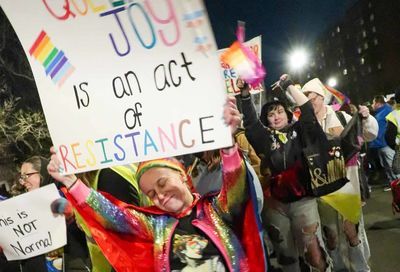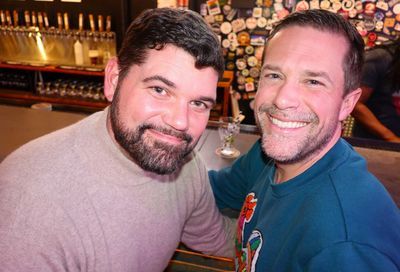Casa Ruby Shuts Down Housing Programs As Workers Go Unpaid
Employees point finger at founder Ruby Corado, saying she exercised tight control over the organization's finances, with little oversight.
By John Riley on July 19, 2022 @JRileyMW

Casa Ruby, the LGBTQ community center and nonprofit that provided shelter and transitional housing to LGBTQ youth, transgender individuals, and immigrant communities, has shut down its housing programs, while employees working for other divisions say they are working without getting paid.
According to The Washington Post, several former employees have accused Ruby Corado, the organization’s founder, of failing to submit proper paperwork on time, and keeping a tight-fisted hold on the organization’s finances, making money inaccessible to various programs despite a steady influx of money in the form of personal donations from community members and government grants.
At least three employees told the Post that they have not been paid in six weeks.
Residents who were living in Casa Ruby’s transitional homes were forced to scramble to find new housing as shelters shuttered and landlords began complaining that the organization had not paid rent or had submitted payments late, resulting in the accumulation of late fees and increasing Casa Ruby’s debt.
The first signs of trouble came last fall, when the D.C. Department of Human Services refused to renew an $839,460 grant given to Casa Ruby to run a low-barrier homeless shelter, which was housing about 10 LGBTQ youth at the time.
According to emails between the Department of Human Services and Casa Ruby, DHS claimed the refusal to renew was based on the organization’s failure to abide by the terms of the grant agreement, embracing the view the grant required Casa Ruby to provide a minimum of 50 low-barrier beds specifically designated for LGBTQ youth.
DHS used that failure to justify its attempts to reduce the original grant amount by half.
At the time, lawyers for Casa Ruby argued that the agreement should be interpreted that Casa Ruby was required to provide up to 50 low-barrier beds, and serve a minimum of 50 youths over the course of the year, but not all would have to be served at the same time.
DHS also demanded that Corado provide a certificate of occupancy from the building being used as a shelter as part of revisions to the grant agreement.
But Corado and other defenders argued that it was just an additional layer of bureaucracy making it more difficult to operate the organization’s programs, and claimed that a DHS point of contact was slow to pay invoices, withheld reimbursements, and misgendered and bullied Corado and other Casa Ruby employees.
At the time, when Metro Weekly sought out comment from DHS, the agency issued a form statement rather than addressing the allegations made by Corado and Casa Ruby, or explaining why the grant was not being renewed or how Casa Ruby was not in compliance.
After the low-barrier shelter was forced to shut down last September due to the loss of the grant money, Corado appealed to the community, raising money via GoFundMe, ostensibly to help LGBTQ youth and trans individuals seeking housing.
Soon after, Corado stepped down from Casa Ruby, claiming she was taking a “sabbatical.” She handed the reins to interim executive director Alexis Blackmon. Corado claimed she had become a target for criticism and was leaving to avoid being a “distraction.”
Yet according to the Post, Corado continued to exercise sole authority over the organization’s finances, with grant money and donations alike funneling into a single account, which no others — including Blackmon, who left the organization in February 2022 — were permitted to access.
While some employees continued to be paid, Corado became unreachable, having allegedly traveled back to her home country of El Salvador, where she had planned to open a branch of Casa Ruby.
Despite not being in the District, she refused to allow others to access the organization’s financial accounts.
According to the Post, Corado reportedly sold her home in Prince George’s County in January for $775,000, leaving her without a local residence.
Corado claimed in a Facebook Live post in May that she was still on sabbatical.
Kisha Allure, a trans woman who previously worked for Casa Ruby as vice president of the organization, and later served as an overnight housing manager and then director of victims services, told Metro Weekly that the organization’s victims services arm was fully funded — and is still being funded, through the end of this year — by government grants from the D.C. Office of Victim Services and Justice Grants.
The office first began receiving grants from OVS in 2018, starting with a $75,000 grant. That amount was eventually increased to over $108,000 in 2021.
Casa Ruby also obtained a smaller grant of $6,000 from the Mayor’s Office of LGBTQ Affairs to assist in running the organization’s “Southeast Wellness Center,” where Allure instituted programming to help survivors of violence, including “Green Thumb Thursdays,” which involved clients of the organization healing from their trauma by working on gardening projects at the Wellness Center property.
The Wellness Center property was one of four properties in the city’s historic Anacostia neighborhood, which had been leased from Union Temple Baptist Church.
Allure said that while she submitted every form she needed to in order to comply with reporting requirements for grant recipients, she never had direct access to the funds, which were controlled by Corado.
Last August, Allure became the first Casa Ruby employee to be notified that she would have to vacate the Wellness Center property. Allure’s office was eventually relocated to 1635 Connecticut Ave. NW, in Dupont Circle, on the opposite side of the city, and the other properties, including transitional housing for LGBTQ youth, the Southeast D.C. drop-in center and housing for immigrants, were eventually vacated in 2022, with Union Temple Baptist Church claiming that Casa Ruby owed it more than $67,000 in overdue rent and late fees.
Allure says she’s both floored by the number of allegations against Corado, while not completely surprised.
She noted that as far back as 2017, when she first became an employee of Casa Ruby, she had heard rumblings from former employees about Corado allegedly failing to pay them for the work they’d done.
Allure also feels disappointed and upset at the prospect that some of the organization’s most vulnerable clients may be left without resources or assistance.
“We were all doing fine work,” she says. “These programs were needed.”
Allure is still in disbelief about the accusations against Corado and doesn’t quite know what to say.
“You’re retraumatizing the lives of so many individuals who are suffering from being traumatized, like you. Why would you do that?” she said.
While Casa Ruby was able to successfully grow itself from a small drop-in center, largely staffed by unpaid volunteers, into a nonprofit with more than 100 employees, the Post notes that several past landlords of buildings utilized by Casa Ruby have complained about irregular and late payment of rent.
Several vendors have also complained they never received full payment from Casa Ruby.
According to federal tax filings, Casa Ruby was bringing in nearly $4.2 million in revenue by 2020, with Corado’s salary increasing from just under $32,000 in 2013 to $260,000 in 2020.
Much of the revenue came from the District, with the city’s Department of Human Services and Mayor’s Office of LGBTQ Affairs providing more than two dozen grants to the organization since 2015. In 2021, Casa Ruby was awarded three grants from DHS totaling nearly $1.7 million, with the money earmarked for low-barrier shelter and transitional housing. (This is separate from the grants obtained through the Office of Victim Services.)
Exacerbating the problem was the fact that, according to the Post, members of Casa Ruby’s board of directors gradually began to quit, leave the area, or cut ties with the organization without being replaced, leading to a lack of oversight.
According to employee Holly Goldmann, Casa Ruby continues to operate some programs, despite only having two physical properties at 1635 Connecticut Ave. NW and 2131 Florida Ave. NW, the latter being used solely as an administrative building.
Employees for Casa Ruby’s victims services, immigration services and Latino services arms are still working with clients and keeping in touch with them, despite not drawing a paycheck.
The organization’s prevention programs, which dealt with health-related matters, including HIV and STI awareness, have been ordered to stop operating, per a directive from the D.C. Department of Health, due to concerns over the organization’s leadership and documents that were allegedly not turned over by Corado.
However, the organization’s pharmacy program and specially-designated housing for LGBTQ immigrants, as well as its low-barrier shelter and transitional housing for LGBTQ youth, have ceased all operations.
Calls to two mobile phone numbers on file for Corado resulted in a message saying the voicemail box had not been set up. Email inquiries seeking comment from Corado were also not returned as of press time.
D.C. Mayor Muriel Bowser said, when asked about the situation at a press conference, that she was saddened by the news.
“I think that a lot of people here know Ruby and know the organization and especially knew the organization when it was doing work that nobody else was doing,” Bowser said. “I’m sad about [the news] because that was an organization that has done good work. But I also know when we give hundreds of thousands and millions of dollars and vendors aren’t getting paid, employees aren’t getting paid, we’ve got a problem. So none of us can turn our back on it. We have to figure out what happened and fix the problem.”
Goldmann told Metro Weekly that it’s been “overwhelming” dealing with the fallout from the ongoing controversy, and the hits that Casa Ruby’s reputation has taken as a result of the negative press surrounding the situation. But she said she’s more concerned about taking care of those who placed their trust in Casa Ruby, only to have it betrayed.
“My concern is for the staff, the clients, and the donors, and making things right for them,” she said. “Someone else will deal with Ruby. We’re dedicated to what we’re doing, and thankful for the people who have reached out.”
Support Metro Weekly’s Journalism
These are challenging times for news organizations. And yet it’s crucial we stay active and provide vital resources and information to both our local readers and the world. So won’t you please take a moment and consider supporting Metro Weekly with a membership? For as little as $5 a month, you can help ensure Metro Weekly magazine and MetroWeekly.com remain free, viable resources as we provide the best, most diverse, culturally-resonant LGBTQ coverage in both the D.C. region and around the world. Memberships come with exclusive perks and discounts, your own personal digital delivery of each week’s magazine (and an archive), access to our Member's Lounge when it launches this fall, and exclusive members-only items like Metro Weekly Membership Mugs and Tote Bags! Check out all our membership levels here and please join us today!
The Magazine
-
Most Popular
 'Porn Star University' Started by Gay-for-Pay Creator Andy Lee
'Porn Star University' Started by Gay-for-Pay Creator Andy Lee  Trump Targets Law Firm for Defending Transgender Rights
Trump Targets Law Firm for Defending Transgender Rights  Montana Governor Signs Anti-Trans Bills into Law
Montana Governor Signs Anti-Trans Bills into Law  Bea Arthur's Air Force Bio Purged by Department of Defense
Bea Arthur's Air Force Bio Purged by Department of Defense  Classical & Choral Music: Spring Arts Preview 2025
Classical & Choral Music: Spring Arts Preview 2025  Anheuser-Busch Abruptly Ends Sponsorship of St. Louis PrideFest
Anheuser-Busch Abruptly Ends Sponsorship of St. Louis PrideFest  Gay Porn Star Tim Kruger Dead at 44
Gay Porn Star Tim Kruger Dead at 44  Priyanka Shetty On Her Incisive New Solo Play '#Charlottesville'
Priyanka Shetty On Her Incisive New Solo Play '#Charlottesville'  Film: Spring Arts Preview 2025
Film: Spring Arts Preview 2025  Above & Beyond: Spring Arts Preview 2025
Above & Beyond: Spring Arts Preview 2025
 Film: Spring Arts Preview 2025
Film: Spring Arts Preview 2025  Classical & Choral Music: Spring Arts Preview 2025
Classical & Choral Music: Spring Arts Preview 2025  Broadway: Spring Arts Preview 2025
Broadway: Spring Arts Preview 2025  Gallery: The Emotionally Sensual Artwork of Soltian
Gallery: The Emotionally Sensual Artwork of Soltian  Montana Governor Signs Anti-Trans Bills into Law
Montana Governor Signs Anti-Trans Bills into Law  Above & Beyond: Spring Arts Preview 2025
Above & Beyond: Spring Arts Preview 2025  Trump Targets Law Firm for Defending Transgender Rights
Trump Targets Law Firm for Defending Transgender Rights  Priyanka Shetty On Her Incisive New Solo Play '#Charlottesville'
Priyanka Shetty On Her Incisive New Solo Play '#Charlottesville'  'Sister Act' at Ford's is a Heavenly Good Time
'Sister Act' at Ford's is a Heavenly Good Time  Popular Music: Spring Arts Preview 2025
Popular Music: Spring Arts Preview 2025
Scene
Metro Weekly
Washington's LGBTQ Magazine
P.O. Box 11559
Washington, DC 20008 (202) 638-6830
About Us pageFollow Us:
· Facebook
· Twitter
· Flipboard
· YouTube
· Instagram
· RSS News | RSS SceneArchives
Copyright ©2024 Jansi LLC.









You must be logged in to post a comment.